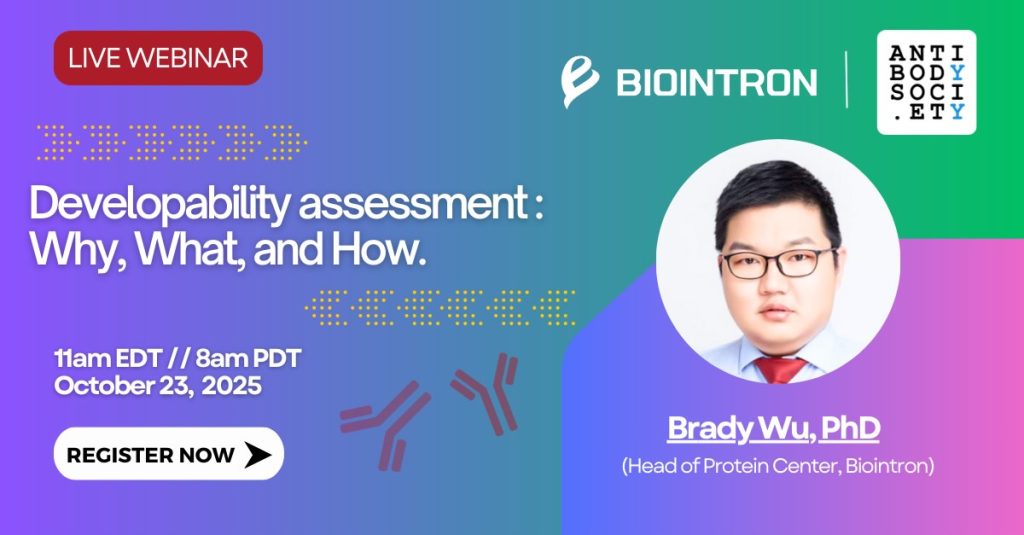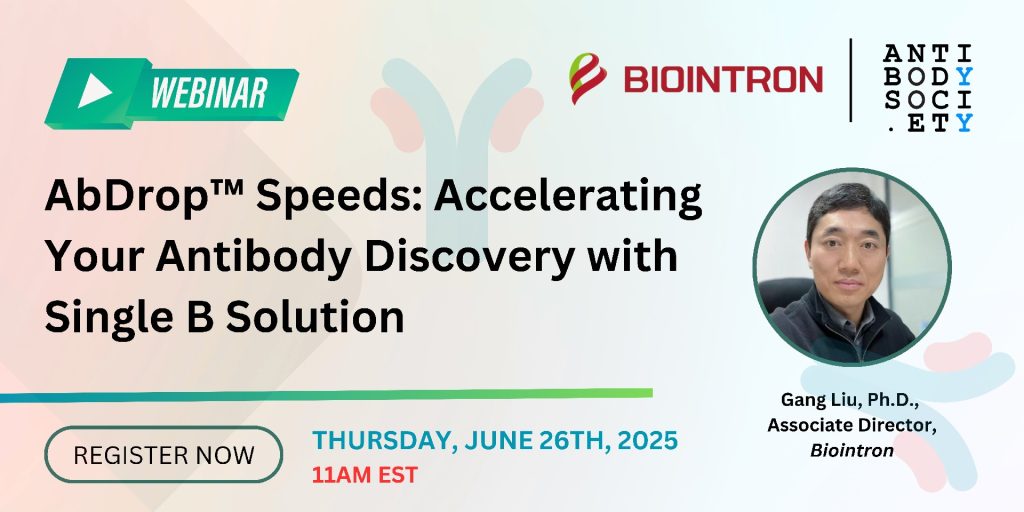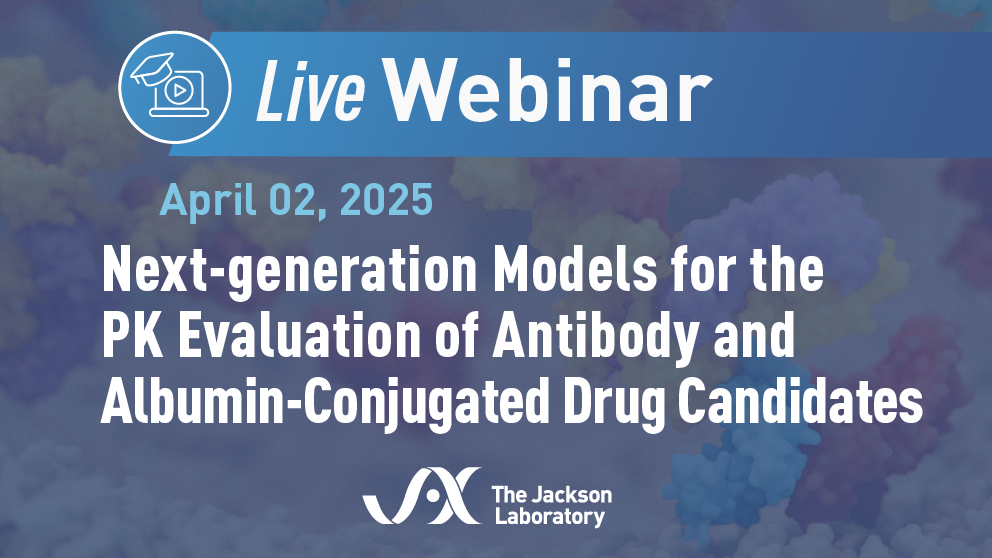In 1975, Köhler and Milstein introduced hybridoma technology, providing a perpetual source of monoclonal antibodies that bind selectively to target antigens.
This breakthrough paved the way for more than 200 approved antibody therapeutics that now benefit millions of patients around the world.
In this webinar, Dr. Paul Carter will provide a historical perspective on the evolution of monoclonal antibody therapeutics and the key advances that have shaped the field. He will discuss:
-
How hybridoma technology enabled the rise of monoclonal antibodies.
-
The development of bispecific antibodies and antibody drug conjugates.
-
Remaining challenges and future opportunities for next generation antibody therapeutics.
Date: December 4, 2025 | Time: 12:00 – 1:00 PM ET.
About the speaker
Dr. Carter is a Genentech Fellow in the Antibody Engineering Department at Genentech. In 2022 he was elected to the US National Academy of Engineering “for creating novel approaches to discovering and developing life-saving antibody therapeutics, including bispecific antibodies”.
Carter co-initiated antibody humanization at Genentech with a novel and patentable method. This technology was utilized in the design of 9 approved antibody products that have been used to treat millions of patients worldwide. Carter and collaborators created ‘knobs-into-holes’ technology utilized in engineering 3+ approved bispecific antibodies.
He also developed a common light chain technology a design concept used for 4+ approved bispecifics. He invented technology E. coli expression technology used to produce one approved Fab product. Carter has authored 125+ scientific publications together cited 28,700+ times. He is an inventor on 54+ issued US patents. He has co-organized 23 international conferences on antibody engineering and antibody therapeutics.
He has delivered 130+ conference presentations and invited lectures including 18 keynote presentations. Carter received a B.A. in Natural Sciences from Cambridge University and his Ph.D. under Sir Greg Winter, Ph.D. at the MRC Laboratory of Molecular Biology in Cambridge. He was a Postdoctoral Fellow with Dr. Jim Wells at Genentech. Carter has nearly 40 years of biotechnology experience including at Genentech, Immunex, Amgen, Seattle Genetics and VLST.
His professional experience includes heading the postdoctoral programs at Genentech, Immunex and Amgen. He served on the Board of Directors of the Antibody Society including as Presiden
We look forward to having you join us for the webinar on December 4, 2025, from 12:00 – 1:00 PM ET.
Register here

𝗛𝗼𝘄 𝗮 ‘𝗦𝘄𝗶𝘁𝗰𝗵𝗮𝗯𝗹𝗲’ 𝗬𝗲𝗮𝘀𝘁, 𝗔𝗻𝘁𝗶𝗯𝗼𝗱𝘆 𝗟𝗶𝗯𝗿𝗮𝗿𝗶𝗲𝘀, 𝗮𝗻𝗱 𝗟𝗮𝗯𝗼𝗿𝗮𝘁𝗼𝗿𝘆 𝗥𝗼𝗯𝗼𝘁𝗶𝗰𝘀 𝗘𝗻𝗮𝗯𝗹𝗲 𝟰-𝗪𝗲𝗲𝗸 𝗛𝗶𝘁 𝗗𝗶𝘀𝗰𝗼𝘃𝗲𝗿𝘆.
Join us on 𝗗𝗲𝗰𝗲𝗺𝗯𝗲𝗿 𝟭𝟭 𝗮𝘁 𝟭𝟮 𝗣𝗠 𝗘𝗧 for a webinar with Neochromosome, Inc., an Opentrons Labworks Inc. company.
𝗜𝗻 𝘁𝗵𝗶𝘀 𝘀𝗲𝘀𝘀𝗶𝗼𝗻, 𝗦𝘁𝗲𝘃𝗲𝗻 𝘄𝗶𝗹𝗹:
– Introduce Neo’s Antibody Discovery Toolkit.
– Present the neoSwitch switchable yeast display/secretion platform designed to accelerate antibody discovery.
– Discuss how protein purification workflows are being automated on the Opentrons Flex.
𝗔𝗯𝗼𝘂𝘁 𝘁𝗵𝗲 𝘀𝗽𝗲𝗮𝗸𝗲𝗿:
𝗦𝘁𝗲𝘃𝗲𝗻 𝗧𝗵𝗼𝗺𝗮𝘀 is the 𝗗𝗶𝗿𝗲𝗰𝘁𝗼𝗿 𝗼𝗳 𝗕𝘂𝘀𝗶𝗻𝗲𝘀𝘀 𝗗𝗲𝘃𝗲𝗹𝗼𝗽𝗺𝗲𝗻𝘁 𝗮𝘁 𝗡𝗲𝗼𝗰𝗵𝗿𝗼𝗺𝗼𝘀𝗼𝗺𝗲 (𝗡𝗲𝗼), an Opentrons Labworks company. He brings 12+ years of hands on and customer facing experience spanning gene synthesis, variant library construction, phage and yeast display, and end to end antibody discovery workflows. Prior to Neo, Steven held technical and commercial roles at Twist Bioscience and SGI-DNA. Trained as a molecular biologist, he partners with biopharma, biotech, and academic teams to design practical campaigns that blend library strategy, selection, and sequencing analytics.
We look forward to having you join us for the session!
Register here
Developability assessment: Why, What, and How – Webinar by BioIntron
Developability is an increasingly critical concept in antibody discovery and development. Previously associated with late-stage outcomes such as stability and formulation, developability assessment is now integrated earlier in the discovery process to enable multidimensional profiling of lead candidates.
- How developability guides real-world projects. From optimizing machine learning algorithms with AI to enabling stability-driven antibody engineering, developability insights are becoming deeply embedded in discovery workflows. As our understanding evolves, so too will its role in shaping the future of drug development.
- Why developability assessments are essential at multiple stages. As biologics grow more complex, early evaluation is key to identifying promising leads. Evidence shows clear correlations between developability parameters and pharmacokinetic (PK) behavior.
- What developability entails. It refers to key biophysical properties such as hydrophobicity, thermal stability, colloidal stability, non-specific binding, and surface charge that collectively inform candidate viability. Our comprehensive assessments complement functional data to support lead selection.
About the speaker:
Dr. Brady Wu, PhD, Head of Protein Center, Biointron is a multidisciplinary scientist and biotech leader; now leading the Protein Science group at Biointron (2024–present), he drives ADC conjugation, developability assessment, and recombinant protein/antibody R&D efforts in the company.
Unprecedented Precision in Format Design – Making Biologics Better, Faster, and Cheaper
In next-generation antibody discovery and engineering, precision is everything. Even minor oversights can compromise data integrity and impact critical decisions.
This webinar, hosted by The Antibody Society in collaboration with Dotmatics and BioGlyph, brings together industry experts to explore how achieving precision from sequence design to data integration can transform antibody R&D outcomes. Speakers will share real-world experiences and highlight the value of integrated discovery-to-design platforms like Luma and BioGlyph.
Date & Time: September 18, 2025 | 12:00 PM EDT / 9:00 AM PDT
Presented By:
-
Christian Olsen, PhD, VP, Strategy – Protein Therapeutics, Dotmatics
-
Fernando Garces, PhD, CEO, BioGlyph
What You’ll Learn:
-
The high stakes of precision in antibody discovery
-
How digital platforms prevent error propagation and improve workflow integration
-
Techniques to connect siloed data and enhance decision-making
-
Industry insights from scientists working in multispecific antibody development
-
The path to faster, better, and more precise antibody R&D
How to Join:
- Join via Microsoft Teams
- Click here to download and add the invite to your calendar
AbDrop™ Speeds: Accelerating Your Antibody Discovery with Single B Solution
Speaker: Gang Liu, Ph.D., Associate Director, Biointron
The seemingly agreeable path of antibody drug development from discovery to market in the modern world is actually filled with what-ifs, in many cases due to inadequate antibody molecules that are robust and “smart” enough to meet the ever-increasing research and clinical requirements. Single B cell screening is an up-to-date antibody discovery strategy that, unlike hybridoma technology, screens primary B cells to obtain diverse antibody candidates. As introduced in the presentation, Biointron’s single B cell screening platform (AbDrop™) is a microfluidic technology-driven, droplet-based, high throughput single B platform for antibody discovery. Integrated with high throughput NGS sequencing and antibody production capacity, AbDrop™ solution achieves antibody discovery goals in a timeline-expediting and diversity-protecting manner. As case studies presented demonstrate, this solution is especially effective for discovery campaigns like challenging targets, rare antibodies, and unique research requirements.
About the speaker:
Dr. Gang Liu is Associate Director of Biointron. He has devoted himself to biological sciences and antibody therapeutics research for more than 20 years. Before joining Biointron, Dr. Liu worked in renowned biotech such as Genscript, and prestigious academia institutions, including Childrens Hospital LA, UC Irvine, and City of Hope Medical Center. Dr. Liu earned his Ph.D. degree from Academy of Military Medical Sciences in China, 2007.
AI-Enhanced Prediction of Clinical Immunogenicity Outcomes with EpiVax’s ISPRI Toolkit
Date: May 8, 2025 at 11:00 am EST
Speakers: Guilhem Richard, Ph.D., Chief Technology Officer, EpiVax.
In silico immunogenicity risk assessment is a key step in the development path for biologic therapeutics. Computational tools have been used to identify T cell epitopes from primary amino acid sequences and assess the immunogenic potential of therapeutic candidates for several decades. In silico modeling during discovery and preclinical development is recommended as T cell epitopes contained in biologic sequences may activate the immune system, enabling the development of anti-drug antibodies that can reduce drug efficacy and/or induce adverse events.
This webinar will review an integrated web-based platform called ISPRI (Interactive Screening and Protein Reengineering Interface) which contains a multitude of tools for assessing immunogenic risk of biotherapeutics, such as identification of promiscuous T cell epitopes, and prediction of anti-drug antibody (ADA) responses. Novel artificial intelligence and machine learning (AI/ML) techniques have now been integrated into ISPRI, leading to improved performance. This presentation will focus on ISPRI’s new AI-based models which have led to a 6-fold increase in the correlation between predicted and observed rates of ADAs, while significantly reducing the rate of false negative (low predicted immunogenicity / high observed immunogenicity) by 85%.
About Guilhem Richard:
Guilhem Richard, Ph.D. is the Chief Technology Officer of EpiVax, Inc. and has over 10 years of experience in computational immunology and vaccinology. Dr. Richard joined the EpiVax immunoinformatics team in 2014, developing new models for understanding the interaction between the immune system and protein sequences, while supporting EpiVax’s commercial and research programs. He spearheaded the development of a new computational platform for the development of personalized, neoantigen-based cancer vaccines (Ancer), and conducted subsequent translational work at EpiVax’s subsidiary company, EpiVax Therapeutics, Inc., from 2019 to 2024 where he served as Chief Scientific Officer/Chief Technology Officer. Dr. Richard has been leading innovation efforts at EpiVax since 2024 and is overseeing the development of its next generation of immunoinformatics tools. Dr. Richard holds a Ph.D. in Bioinformatics from Boston University and a M.Eng. in Bioinformatics and Modeling from the National Institute of Applied Sciences (INSA) of Lyon, France.
Register here
Balancing innovation and efficiency in antibody drug development is no easy task. Researchers often face delays due to fragmented tools and bottlenecks in data access and analysis.
But what if you could predict antibody liability sites in real time, without waiting on bioinformatics pipelines?
Join us for a webinar where Zev Wisotsky, Ph.D. and Samantha Jeschonek, Ph.D. showcase how 𝗦𝗶𝗴𝗻𝗮𝗹𝘀𝗢𝗻𝗲 empowers scientists to streamline the Design-Make-Test-Decide cycle, accelerating ADC discovery and improving developability assessments.
𝗪𝗵𝗮𝘁 𝘆𝗼𝘂’𝗹𝗹 𝗹𝗲𝗮𝗿𝗻:
– Real-time antibody liability prediction to improve developability
– How to apply the Design-Make-Test-Decide framework to ADC discovery
– How to reduce dependency on bioinformatics teams
– Ways to unify your workflow and minimize task-switching
It’s a great chance to see how SignalsOne is helping scientists make antibody discovery faster, more predictive, and more efficient.
Webinar Details
Date: April 29th, 2025 | Time: 11 AM, EDT
Speakers
Zev Wisotsky is a Sr. Principal Marketing Manager for Biologics in the Signals Suite. His scientific training and research background includes neuroscience, biochemistry, molecular biology, and drug discovery. He has spent 7+ years in software in go-to-market teams across industries with a heavy focus on biopharma/biotech R&D.
Samantha Jeschonek is the product manager for Data-driven Analytics in Signals Research Suite, Lead Discovery Premium, and Lead Discovery. She holds a Ph.D. in Molecular Biology, Cell Biology, and Biochemistry. She has spent the last several years as a product manager for drug discovery informatics software. In addition to more than a decade of bench experience in molecular biology, she brings a passion for FAIR data / metadata to the Revvity Signals product team.
Advancements in AI are revolutionizing antibody design, enabling the creation of epitope-specific antibodies with exceptional specificity, developability, and function. But how are these breakthroughs being applied in real-world discovery?
Join us as Surge Biswas, co-founder and CEO of Nabla Bio, discusses how generative AI and experimental screening technologies are reshaping antibody discovery.
Date: April 10, 2025
Time: 11:00 AM EST
About the Speaker:
Surge Biswas is a co-founder and the CEO of Nabla Bio, a company developing generative AI and experimental screening technologies for next generation antibody design. Prior to Nabla, Surge obtained his PhD from George Church’s lab at Harvard University, where he and his colleagues developed the first protein language models and demonstrated their great promise for protein design.
Don’t miss this opportunity to hear directly from an innovator in the field and gain insights into the future of AI-driven therapeutics.
The Jackson Laboratory’s upcoming April 2 virtual symposium will showcase JAX’s humanized models designed to enable rational selection of lead therapeutic candidates with more accurate predictions of biologic drug performance.
These next-generation humanized models faithfully reproduce human physiology and pathology, providing equivalent or better predictive ability than nonhuman primates for human pharmacokinetics. Industry experts will share their insights through three 20-minute presentations.
Register here to learn more and view the full event details.
Limitations of conventional specificity tools have contributed to undetected polyspecificity in antibody drugs. We performed a systematic specificity analysis of preclinical and clinical antibodies and identified a surprisingly high rate of off-target binding throughout the industry, with up to one third of antibody drugs displaying off-target binding.
Our findings across different phases of drug development suggest polyspecificity is a major source of drug attrition, and better tools could help to improve drug approvals and patient safety.
In this webinar, we will discuss the emergence of cell-based protein arrays as an alternative and improved technology to evaluate antibody specificity.
Insights You Don’t Want to Miss:
-
Learn how cell-based protein arrays, including Integral Molecular’s Membrane Proteome Array™ (MPA), enables precise assessment of binding interactions.
- Why the MPA identified off-target interactions that were missed in tissue cross-reactivity studies.
-
How early detection of off-target antibody binding can mitigate drug toxicity and attrition.
Webinar Details
Date: February 27, 2025 | Time: 11 AM, ET
Speakers

Diana Norden is a Senior Scientific Writer at Integral Molecular. Her work primarily focuses on applications of the Membrane Proteome Array, including regulatory requirements for specificity testing. She has written extensively on current standards and best practices for antibody specificity profiling, and recently co-authored a review on emerging trends in biotherapeutic specificity testing that was published in mAbs. Diana earned her Ph.D. from The Ohio State University in 2015.

Kristopher Raghavan is a Senior Application Scientist at Integral Molecular, specializing in the Membrane Proteome Array. Since joining in 2022, he has been instrumental in establishing the MPA as the leading solution for antibody specificity profiling. Kristopher offers technical support, manages projects, and analyzes data for customer projects. He earned his Ph.D.from Drexel University in 2021.
This is a great opportunity to stay ahead of evolving standards in antibody specificity testing.
Register here
We hope you can join us, and we look forward to seeing you there!
 In this webinar we will critically review the current methods for generating early developability data, identify existing shortcomings and present innovative high-throughput assays utilizing the plate-based PAIA technology. Attendees will learn about how to use this method which is designed to deliver reliable and unambiguous biophysical developability data, serving as an efficient replacement for time-intensive and laborious HPLC and ELISA methods.
In this webinar we will critically review the current methods for generating early developability data, identify existing shortcomings and present innovative high-throughput assays utilizing the plate-based PAIA technology. Attendees will learn about how to use this method which is designed to deliver reliable and unambiguous biophysical developability data, serving as an efficient replacement for time-intensive and laborious HPLC and ELISA methods.
Key Takeaways:
- Review of current methods for early developability data generation.
- Identification of shortcomings in existing techniques.
- Introduction to PAIA high-throughput assays for efficient biophysical data collection.
About Speaker:
Sebastian Giehring earned his PhD in analytical chemistry from the University of Hamburg. He subsequently worked in a scientific role at a spectrometry company before transitioning to a venture capital firm as an investment manager for life sciences. In 2006, he chose to change to the startup sector, taking on various management roles in life science tool companies. In 2014, he invented the PAIA microplate technology and founded PAIA Biotech GmbH, where he has served as CEO ever since.
Register here to secure your spot!
Note: The webinar platform and registration process is managed by Community Brands.
Their privacy policy is here.










